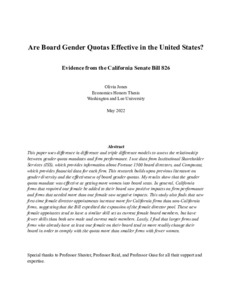| dc.rights.license | In Copyright | en_US |
| dc.creator | Jones, Olivia | |
| dc.date.accessioned | 2022-05-09T12:54:25Z | |
| dc.date.available | 2022-05-09T12:54:25Z | |
| dc.date.created | 2022 | |
| dc.identifier | WLURG38_JonesO_ECON_2022 | |
| dc.identifier.uri | http://hdl.handle.net/11021/35849 | |
| dc.description | Thesis; [FULL-TEXT FREELY AVAILABLE ONLINE] | en_US |
| dc.description | Olivia Jones is a member of the Class of 2022 of Washington and Lee University. | en_US |
| dc.description.abstract | This paper uses difference in difference and triple difference models to assess the relationship between gender quota mandates and firm performance. I use data from Institutional Shareholder Services (ISS), which provides information about Fortune 1500 board directors, and Compustat, which provides financial data for each firm. This research builds upon previous literature on gender diversity and the effectiveness of board gender quotas. My results show that the gender quota mandate was effective at getting more women into board seats. In general, California firms that required one female be added to their board saw positive impacts on firm performance and firms that needed more than one female saw negative impacts. This study also finds that new first-time female director appointments increase more for California firms than non-California firms, suggesting that the Bill expedited the expansion of the female director pool. These new female appointees tend to have a similar skill set as current female board members, but have fewer skills than both new male and current male members. Lastly, I find that larger firms and firms who already have at least one female on their board tend to more readily change their board in order to comply with the quota more than smaller firms with fewer women. | en_US |
| dc.format.extent | 34 pages | en_US |
| dc.language.iso | en_US | en_US |
| dc.rights | This material is made available for use in research, teaching, and private study, pursuant to U.S. Copyright law. The user assumes full responsibility for any use of the materials, including but not limited to, infringement of copyright and publication rights of reproduced materials. Any materials used should be fully credited with the source. | en_US |
| dc.rights.uri | http://rightsstatements.org/vocab/InC/1.0/ | en_US |
| dc.subject.other | Washington and Lee University -- Honors in Economics | en_US |
| dc.title | Are Board Gender Quotas Effective in the United States? Evidence from the California Senate Bill 826 (thesis) | en_US |
| dc.type | Text | en_US |
| dcterms.isPartOf | RG38 - Student Papers | |
| dc.rights.holder | Jones, Olivia | |
| dc.subject.fast | Reverse discrimination in employment | en_US |
| dc.subject.fast | Employment (Economic theory) | en_US |
| dc.subject.fast | Success in business | en_US |
| local.department | Economics | en_US |
| local.scholarshiptype | Honors Thesis | en_US |
